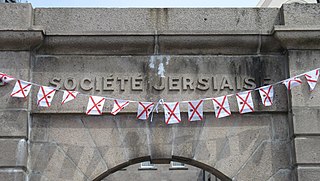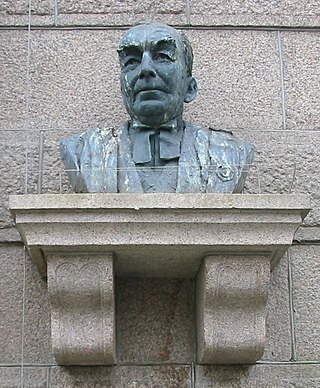
The Channel Islands are an archipelago in the English Channel, off the French coast of Normandy. They are divided into two Crown Dependencies: the Bailiwick of Jersey, which is the largest of the islands; and the Bailiwick of Guernsey, consisting of Guernsey, Alderney, Sark, Herm and some smaller islands. Historically, they are the remnants of the Duchy of Normandy. Although they are not part of the United Kingdom, the UK is responsible for the defence and international relations of the islands as it is for the other Crown Dependency, the Isle of Man, and the British Overseas Territories. The Crown Dependencies are neither members of the Commonwealth of Nations, nor part of the European Union. They have a total population of about 171,916, and the bailiwicks' capitals, Saint Helier and Saint Peter Port, have populations of 33,500 and 18,207 respectively.

Victoria College is a Government-run, fee-paying, academically selective day school for boys in St Helier, Jersey. Founded in 1852, the school is named after Queen Victoria. It is owned and administered by the Government of Jersey and is located on Mont Millais adjacent to Jersey College for Girls, the Government fee-paying secondary school for girls. As a fee-charging school and a member of the Headmasters' and Headmistresses' Conference (HMC), Victoria College is often considered a private school or a public school in the British sense of the term, despite receiving government funding.

The military occupation of the Channel Islands by Nazi Germany lasted for most of the Second World War, from 30 June 1940 until liberation on 9 May 1945. The Bailiwick of Jersey and Bailiwick of Guernsey are British Crown dependencies in the English Channel, near the coast of Normandy. The Channel Islands were the only de jure part of the British Empire in Europe to be occupied by Nazi Germany during the war. Germany's allies Italy and Japan also occupied British territories in Africa and Asia, respectively.

Despite its small size, the population of Jersey is made of people with a diverse range of religions and beliefs. Traditionally seen as a Christian island, Jersey's established church is the Church of England, and Anglicanism and Catholicism are practised on the island in roughly equal numbers. Together, these religions account for around half the population of Jersey. Other denominations of Christianity and other religions such as Islam, Judaism, Sikhism, and Buddhism account for handfuls of people on the island. In recent years, irreligion has been an increasing force in Jersey, with two fifths of the population identifying as having no religion. This number rises to 52% for Jersey people under 35.

The Société Jersiaise is a learned society in Jersey which was founded in 1873, in the manner of similar county societies in the United Kingdom and Sociétés Savantes in France for the purposes of:

La Hougue Bie is a historic site, with museum, in the Jersey parish of Grouville. La Hougue Bie is depicted on the 2010 issue Jersey 1 pound note.
Sir Ambrose James Sherwill was Bailiff of Guernsey from 1946 to 1959. In the early months of World War II, he helped in the administration of the Channel Islands when they were occupied by the Germans.

Norman Le Brocq was a communist, trade union activist, and a leader of a Jersey resistance cell opposed to the German occupation of the Channel Islands during World War II. The resistance cell distributed anti-fascist propaganda throughout Jersey and sheltered slave labourers who had escaped from German captivity. After the liberation of France by the allied forces, a German soldier connected with Le Brocq and they began planning a mutiny against the German commanders on the islands. However, the war ended before the mutiny could be attempted. After the war, Le Brocq became a human rights activist, campaigning for a minimum wage, equitable divorce laws, compulsory school education and health insurance, and the introduction of a minimum wage. He also won several elections throughout the 1960s and 70s to serve as a Jersey State Deputy. Le Brocq was a life-long member of the Communist Party of Great Britain (CPGB).
George Reginald Balleine was a prominent historian and writer in the Island of Jersey.
SirVictor Gosselin Carey a resident of Guernsey on the Channel Islands. He held the post of Bailiff of Guernsey from 1935 to 1946. Carey was a leading member of one of Guernsey's oldest families. In 1935, when incumbent Baliff Arthur William Bell died, Carey, who had been Receiver General from 1912 to 1935, replaced him because Procurer Ambrose Sherwill, to whom the role would have normally fallen, had only been in office a few weeks.
The Granville raid occurred on the night of 8–9 March 1945 when a German raiding force from the Channel Islands landed in France and brought back supplies, Allied prisoners and former German prisoners of war to their base.

Alexander Moncrieff Coutanche, Baron Coutanche was a former Bailiff of Jersey and member of the House of Lords in the United Kingdom.
Matthew Le Marinel was a Jersey Anglican clergyman, who became Dean of Jersey.
The Reverend Sir John Leale was a Guernsey Jurat and Methodist minister, who assumed the role as President of the States of Guernsey Controlling Committee during the occupation of the Guernsey by Nazi Germany (1940–1945).

Robert Winter Le Sueur, MBE was a British humanitarian. A resident of Jersey, he was awarded an MBE for his efforts in assisting escaped Russian prisoners, in Jersey, during the Nazi Occupation of the Channel Islands.

During the German occupation of the Channel Islands, there was limited resistance. The islands had a very high number of German soldiers compared to the civilian population, one soldier for every 2-3 civilians, which reduced options; this linked to the severe penalties imposed by the occupiers meant that only forms of non-lethal resistance were used by the population. Even so, over twenty civilians died for resistance against the occupiers.

Louisa Mary Gould was a Jersey shopkeeper and a member of the British resistance movement in the Channel Islands during World War II. From 1942 until her arrest in 1944, Gould sheltered an escaped Soviet forced labourer known as Fyodor Polycarpovich Buriy Бурый, Фёдор Поликарпович on the island of Jersey. Following a trial, she was sent to the Ravensbrück concentration camp where she was gassed in 1945. In 2010 she was posthumously named a British Hero of the Holocaust.
Gillian "Gilly" Carr is a British archaeologist and academic. She currently specialises in the Holocaust and conflict archaeology, while her early career research focused on the Iron Age and Roman Archaeology. She is an associate professor and academic director in archaeology at the University of Cambridge's Institute of Continuing Education, and a fellow and director of studies in archaeology at St Catharine's College, Cambridge. In 2019, she was elected a Fellow of the Society of Antiquaries of London and of the Royal Historical Society. In 2020, she won the EAA European Heritage Prize for her work on the heritage of victims of Nazism.

During the five-year German occupation of the Channel Islands civilian life became much more difficult. During that time, the Channel Islanders had to live under and obey the laws of Nazi Germany and work with their occupiers in order to survive and reduce the impact of occupation. Given no guidance on how to behave by the British government, there were individuals who got close to the enemy and others who undertook resistance activities.

Ivy Forster was a politician from Jersey. During World War II she and her family sheltered Russian forced labourers brought to the islands by the Nazis, activity that resulted in her sister being killed in a concentration camp. After the war, Forster was elected to the States in 1948, becoming its first female member.












